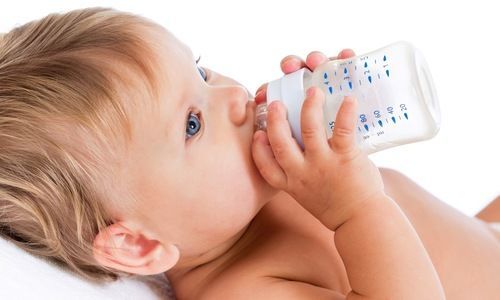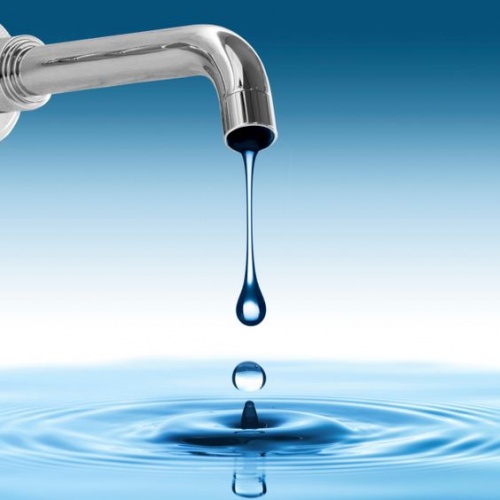Why Babies Shouldn't Drink Water before 6 Months

Should babies drink water before the age of 6 months? If the answer were obvious, we wouldn’t asking this question. But many specialists advise against it.
We know that water is a vital element for all living beings. However, it is best to abstain from giving water to babies who are younger than 6 months old.
A mother’s breast milk becomes a fundamental source of nourishment for babies from the minute they are born. This continues to be true for many months after.
Medical experts believe that all of the nourishment and hydration that babies need is provided through breastfeeding. Perhaps, at the time when they begin to incorporate complementary nourishment, they can also begin water intake.
Why shouldn’t babies drink water before 6 months
The main reason that babies shouldn’t drink water before 6 months is that they don’t need it. In fact, if offered, they might even reject it. You should never force a baby to drink water; there is no reason to do so. It is normal for young babies not to drink water, and there are no negative consequences.

Thirst is something that’s easy to detect even in small children. When they are older and begin to talk, they are able to communicate their thirst verbally. In fact, it is one of the first things they learn to express in words.
But babies who are exclusively breastfed do not feel thirst. It is a sensation that appears only as soon as babies start to ingest elements other than breast milk.
According to experts, babies should be given breast milk exclusively until they are 6 months old. By “exclusive” we mean that it is the only thing that babies should take in.
Therefore, water is not the only thing you should not give your baby. You should not give your baby any other foods or liquids before 6 months. Everything your baby needs as far as nutrition and hydration during this time is received through your breast milk.
The World Health Organization gives two basic reasons for why you shouldn’t give water to babies under 6 months. The first, as we already stated, is that they don’t need it. The second reason is that it can affect the way in which they feed.
According to specialists, all the hydration your baby needs is in your breast milk. If your baby drinks water, this could reduce the amount of breastmilk he ingests.

In the rare case that a baby does need water, what water should you give him?
In some exceptional cases, there are babies who do drink water before they reach 6 months. Sometimes this is simply due to their parents lack of information. But it may also be due to problems caused by fever or gastroenteritis.
If water is necessary, then it’s important to take into consideration certain criteria that the water should meet. For example:
- Only give your baby water that you are sure is safe for drinking. It should contain little or no fluoride and should not come from lead pipes. Even if it is considered safe for drinking, you should still be careful. Boil it and then wait until it reaches room temperature before giving it to your baby.
- Bottled water, though preferable, is not always the best option. Before giving your baby bottled water, you must verify that it is low in fluoride, iodine and nitrates. In general, the label will indicate if the water is suitable for infant consumption. You should also check that it has a low mineral content. Some mothers adopt the custom of also boiling bottled water.
When a baby begins a complementary diet, many of the foods he starts to eat also have water in them. Soups, purees and juices supply your baby with a good part of the hydration that he requires. Also, he’ll still be breastfeeding.
Therefore, all your baby needs at this point is small sips of water. This will be enough to quench the thirst caused by the food he is eating.
How can I be sure my baby doesn’t need to drink water?
You might not have known this before, but breast milk has your baby covered. In fact, your child can drink your breast milk out of thirst as well.
Let’s remember that while your little one was inside the womb, she was hydrated in a completely different way. She only came to know breast milk as nourishment once she was born.
If you pay special attention, you can observe that in some instances, your baby nurses in very small amounts. It is possible that these episodes have more to do with thirst than with hunger. Perhaps that explains why most babies reject water when you offer it to them. Their thirst has already been quenched.
Why would they want water when they’ve already met their need through mom’s breast milk?
How can you tell if a baby is nursing out of thirst rather than hunger? He will nurse outside of his normal routine. Also, he’ll only drink a little from each breast.
The common understanding is that the baby does this out of thirst. The first milk that comes out of the breast is more watery than the milk that comes later on. That’s why he drinks just a little from each side.
All cited sources were thoroughly reviewed by our team to ensure their quality, reliability, currency, and validity. The bibliography of this article was considered reliable and of academic or scientific accuracy.
- H. K. J. P. Wickramasinghe, A. J. Kramer, and J. A. D. R. N. Appuhamy. Drinking water intake of newborn dairy calves and its effects on feed intake, growth performance, health status, and nutrient digestibility. J. Dairy Sci. 102:377–387 https://doi.org/10.3168/jds.2018-15579
- Growing Strong—Healthy drinks for baby (PDF, 557kB), Queensland Government.